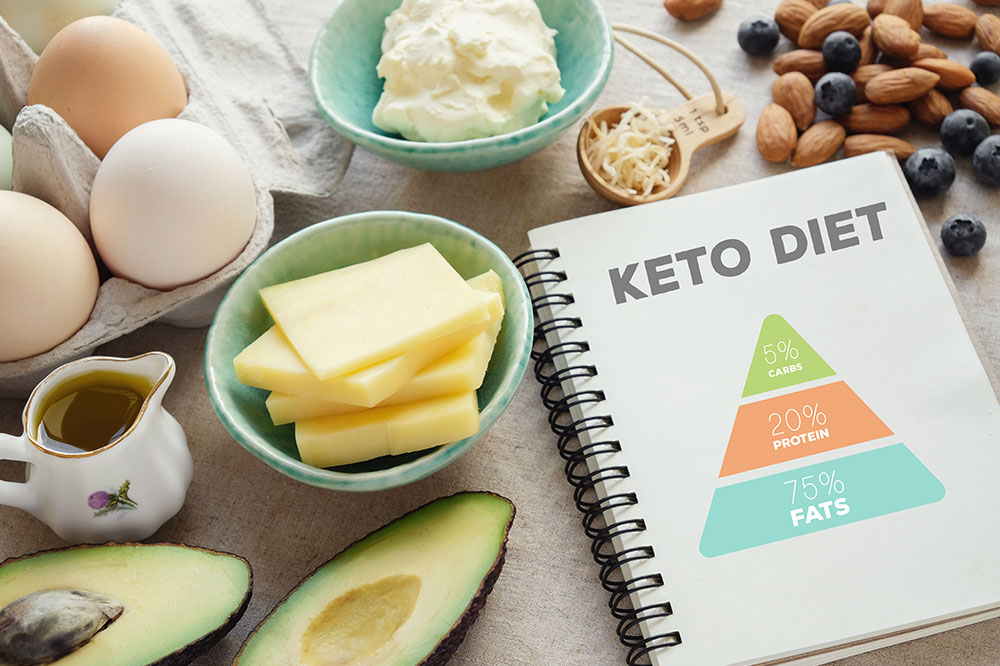
Everything to know about the keto diet
The Ketogenic or keto diet has become popular among fitness enthusiasts over a few years. The store shelves are also lined up with keto-friendly food products. In simple terms, it is the low-carb and high-fat meal plan that has a myriad of health benefits. It also helps in lowering the risks of some diseases. That said, certain pitfalls are involved with this kind of meal plan. So, let’s look into the different aspects of the ketogenic meal plan.
Ketogenic Diet – An overview
A k eto diet consists of foods with low carbohydrate content and a high quantity of essential fatty acids. It has several features common with the Atkins or the low-carb meal plan. This meal plan will help drastically reduce carbohydrate intake and replace it with healthy fats. It leads the body to engage in the metabolic process called ketosis. It helps lower insulin and blood sugar levels, manage BMI, and increase energy levels.
Who can follow it?
People follow the keto diet more often to reduce their body mass index levels, but it has certain health benefits also. This meal plan is advantageous in treating diabetes, epilepsy, and many other chronic illnesses. It is also helpful to manage brain diseases, heart diseases, and acne. Having said that, research is required to substantiate the benefits. It is recommended to talk to a healthcare provider or nutritionist and follow their plan to control or treat the symptoms of these health conditions. In addition, they decide whether it’s safe for a person to follow a ketogenic meal plan, according to their health condition.
Types of keto diets
There are various types of keto diets, which include the following:
- Standard Ketogenic Diet or SKD
The SKD is a low-carb, high-fat, moderate-protein meal plan. It usually comprises 70% fat, 10% carbs, and 20% proteins. - Targeted Ketogenic Diet or TKD
The TKD includes carbs during workouts and is similar to SKD. - Cyclical Ketogenic Diet or CKD
CKD is also referred to as the recurrent Keto diet, which includes days of higher carb intake. For example, five ketogenic days followed by two carb days. - High Protein Ketogenic Diet
It is similar to SKD but involves more intake of proteins. The ratio is usually 35% protein, 60% fats, and 5% carbs.
It is to be noted that the SKD and high-protein ketogenic diets have been studied entirely, and athletes or bodybuilders mostly follow the other two, which are more beneficial.
Foods to include in the keto diet
One can have large amounts of the following in the keto diet:
- Avocado
- Bacon
- Butter
- Animal fats
- Egg yolk
- Cheese
- Coconut
- Nuts, seeds, and nut butter
- Olive Oil and other plant-based oils
Small amounts of the following can also be included:
- Fish
- Eggs
- Meat, including chicken
- Seafood
The following foods should be taken in limited quantities.
- Broccoli
- Cucumber
- Tomatoes
- Celery
- Peppers
- Leafy greens
- Asparagus
Foods to avoid
- Grains or starches
- Juices
- Chips and crackers
- Beans and legumes
- Unhealthy fats
- Certain types of sauces and condiments
Advantages of the keto diet
A keto diet is highly beneficial in treating various health conditions.
- Diabetes and prediabetes
Along with the doctor-recommended treatment options for these conditions, the keto diet is also helpful in reducing the excess fat that is associated with prediabetes, type 2 Diabetes, and various metabolic syndromes. It has been found that this meal plan can improve insulin sensitivity by 75%. - Other health conditions
Following the diagnosis of certain health conditions, the healthcare provider may also suggest following a keto diet to complement the other treatments. This helps treat diseases like epilepsy, heart disease, brain injuries, Parkinson’s disease, and Polycystic Ovary Syndrome. However, please note that research in some of these areas is still limited.
Disadvantages of the keto diet
A keto diet also comes with certain side effects, such as:
- Keto flu
- Constipation
- Stress on the kidneys causes gout and increases kidney stones risks
- It is not sustainable and does not have long-term benefits
- It does not suit everyone
The keto diet may benefit people seeking to reduce their BMI levels, have diabetes, and boost their metabolic health. However, it has benefits and disadvantages . It may not be sustainable and suitable for certain individuals’ preferences and lifestyles. Always consult a healthcare practitioner to determine if a keto diet fits your health well. And you don’t have to worry about deviating from this meal plan when you dine out because nowadays, many restaurants offer special food items, including low-carb and high-fat meals.




